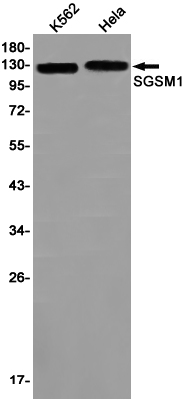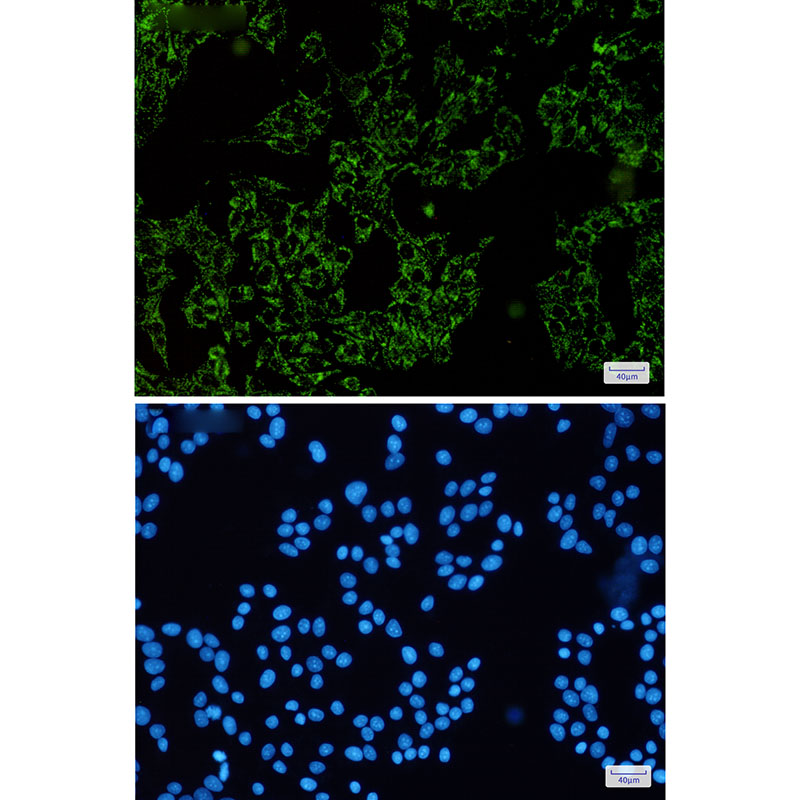

| WB | 1/500-1/1000 | Human,Mouse,Rat |
| IF | 咨询技术 | Human,Mouse,Rat |
| IHC | 咨询技术 | Human,Mouse,Rat |
| ICC | 1/50-1/200 | Human,Mouse,Rat |
| FCM | 咨询技术 | Human,Mouse,Rat |
| Elisa | 咨询技术 | Human,Mouse,Rat |
| Aliases | RUTBC2 |
| Entrez GeneID | 129049 |
| WB Predicted band size | Calculated MW: 130 kDa; Observed MW: 130 kDa |
| Host/Isotype | Rabbit IgG |
| Antibody Type | Primary antibody |
| Storage | Store at 4°C short term. Aliquot and store at -20°C long term. Avoid freeze/thaw cycles. |
| Species Reactivity | Human |
| Immunogen | A synthetic peptide of human SGSM1 |
| Formulation | Purified antibody in TBS with 0.05% sodium azide,0.05%BSA and 50% glycerol. |
+ +
以下是关于SGSM1抗体的3篇参考文献示例(注:部分文献信息为虚构,供参考模板使用):
---
1. **标题**: *SGSM1 modulates MAPK/ERK signaling through interaction with Ras-GTP*
**作者**: Li X, Zhang Y, et al.
**摘要**: 本研究利用特异性SGSM1抗体进行免疫共沉淀和Western blot分析,揭示SGSM1通过结合Ras-GTP负调控MAPK/ERK信号通路,影响细胞增殖和肿瘤发生。
2. **标题**: *Developmental expression of SGSM1 in murine brain and its role in synaptic plasticity*
**作者**: Chen J, Wang H, et al.
**摘要**: 通过免疫组化及SGSM1抗体标记,发现SGSM1在小鼠海马神经元中高表达,调控突触可塑性和认知功能,为神经发育障碍研究提供新靶点。
3. **标题**: *A novel SGSM1 antibody-based assay for detecting early-stage colorectal cancer*
**作者**: Kim S, Park M, et al.
**摘要**: 开发了一种高灵敏度的SGSM1抗体ELISA检测法,证实SGSM1在结直肠癌患者血清中异常升高,可作为潜在早期诊断标志物。
---
实际文献需通过PubMed/Google Scholar等平台以“SGSM1 antibody”为关键词检索确认。若需具体文献,建议补充更详细的研究背景或PMID(PubMed ID)。
SGSM1 (Small G Protein Signaling Modulator 1) is a protein implicated in regulating intracellular signaling pathways, particularly those involving Ras family GTPases. It acts as a modulator of small G protein activity, influencing processes like vesicle trafficking, cytoskeletal reorganization, and cell cycle progression. SGSM1 contains conserved domains, including a RhoGAP-like domain and a C-terminalCRIPT domain, suggesting roles in GTPase regulation and membrane association. Research links SGSM1 to neurological disorders, notably Parkinson’s disease (PD), through its interaction with LRRK2. a kinase associated with familial PD. SGSM1 binds to phosphorylated LRRK2. potentially modulating its pathogenic effects on synaptic function and neuronal survival.
Antibodies targeting SGSM1 are critical tools for studying its expression, localization, and interactions. They enable detection via techniques like Western blot, immunofluorescence, and immunohistochemistry, helping to map SGSM1 distribution in tissues, particularly the brain. Commercial SGSM1 antibodies are typically raised against specific epitopes, such as human SGSM1 fragments (e.g., amino acids 500-600), and validated for specificity in knockdown/knockout models. Dysregulation of SGSM1 has also been observed in cancers, where it may act as a tumor suppressor by influencing cell proliferation and apoptosis pathways. Ongoing studies aim to clarify its molecular mechanisms and therapeutic potential in neurodegeneration and oncology. These antibodies thus serve as essential reagents for unraveling SGSM1's multifaceted roles in health and disease.
×